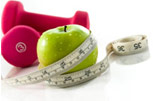Weight Loss Resources
Hundreds of articles about weight loss ...
Successful Weight Loss
Your energy expenditure must be more than your energy intake in order for weight loss to be achieved. The daily recommended intake of calories for a woman is 2,000 and for a man 2,500.
In order to lose 1 pound of body fat your body must burn 3,500 calories in one week. At rest your body burns 1,800 calories (average person) and these calories usually come from the diet. So if you normally consume approximately 2,000 calories a day and you reduce your intake by 500 calories per day, in seven days your body should have burnt off one pound of body fat. The degree with which you reduce your calorie intake compared to what you would usually eat, will determine how much weight you lose. A realistic target is 1 to 2 pounds per week. It is important to that your weight loss is at a steady rate if you are to keep the weight off long term.
Tips to eat healthy & aid weight loss
- Eat breakfast - try wholegrain cereals and bread to keep you fuller for longer
- Cut down your total fat intake
- Reduce how much sugar you eat
- Cut down on salt
- Limit your alcohol consumption to 1 - 2 drinks a week (normal measures)
- Eat more fruit and vegetables
- Drink water instead of fruit juices
- Reduce portion sizes
- Eat small meals more regularly to avoid drops in blood sugar levels
Disclaimer
You are advised to seek medical advice before making any changes to your diet or lifestyle with an aim of weight loss. This website and the content provided should not be used by persons under 18, by pregnant or nursing women, or individuals with any type of health condition, except under the direct supervision of a qualified medical professional. The information contained in these articles, and elsewhere on this website, is provided for educational and entertainment purposes only, and is not intended to replace, and does not constitute legal, professional, medical or healthcare advice or diagnosis and may not be used for such purposes. Continue...

